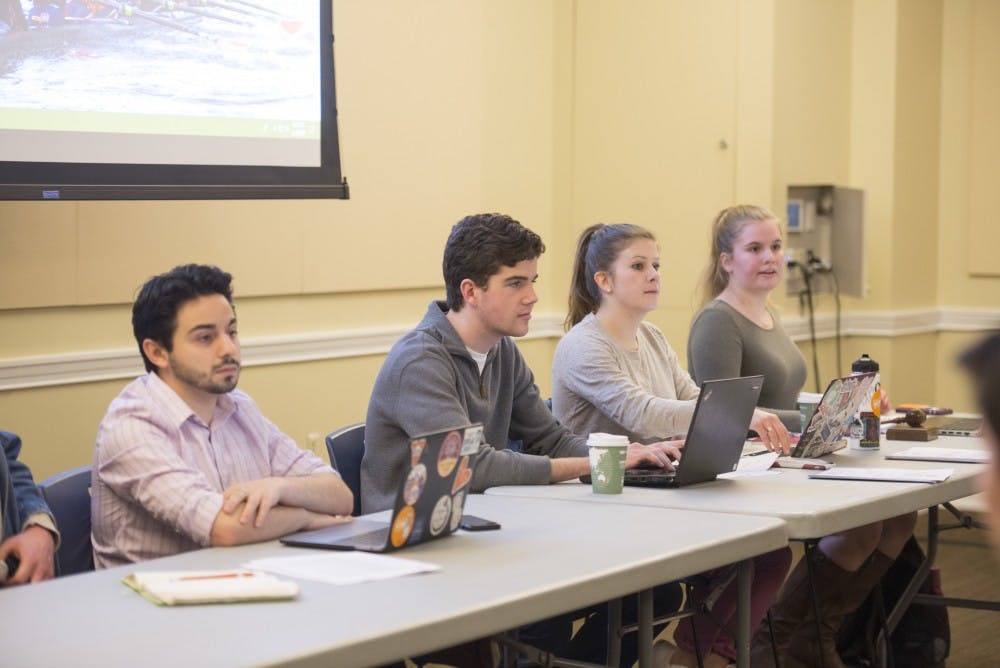University Law Prof. Margaret Riley addressed Student Council on proposed changes to a policy regulating the use of University property by outside speakers at its meeting Tuesday. Student Council President-Elect Alex Cintron also announced his incoming chief of cabinet and the Representative Body amended and tabled a bill that would require members to dismiss themselves from their position on the council if found guilty of an Honor or University Judiciary Committee violation.
The changes to the policy regarding the use of University property by individuals and groups unaffiliated with the University would require outside groups or individuals to make a reservation within seven days prior to the date of anticipated use. Events, such as public speaking, protesting or distributing literature, will be restricted to two-hour blocks and capped at 25 individuals. Outside speakers’ ability to hold events will also be confined to certain locations on Grounds. Locations have not been decided.
“This is designed to affect only one part of our property, outsiders in mostly outside property,” Riley said. “It is not designed to have any effect on anything that affiliated people do.”
The policy initiative is spearheaded by the Deans Working Group, which was created in response to the events of Aug. 11 and 12, when white nationalists marched on Grounds and held the deadly Unite the Right rally in downtown Charlottesville.
“To think about how to move the University forward not in a negative fashion but in a positive fashion as a response to [the events of Aug. 11 and 12],” Riley said. “This is in direct response to those events.”
There are currently no restrictions on unaffiliated groups gathering on University property. The proposal is a potential solution to the University’s lack of oversight of outside groups holding events on Grounds.
“Because we had no rules in terms of our outdoor property, we had no way to determine who could come, but we never had real notice,” Riley said.
If the proposal came into effect, University officials will not restrict outside groups based on the intended content of their event, unless it impedes normal school operations.
Ian Ware, a third-year College student and Student Council representative, raised concerns about the university's inability to decline reservations based on content.
“Regarding your answer as to whether to protestors from August 11 and 12 applied and followed every part of the rules and would be allowed, to me that kind of seems at odds with the clause that says that it can’t impede normal operations,” Ware said. “To me as a student, if one of those groups were to come to Grounds, I wouldn’t feel safe going to class.”
Riley responded to Ware’s concerns and informed the body that the University could not legally restrict white nationalists from coming to Grounds solely based on the content of their event until it directly hindered normal University operations.
“I may share [your view] in my non-law school professor role,” Riley said. “Unfortunately in my law school professor role, what we would have to do could not stop them. We could not intricately intervene until it crosses that line.”
Following the discussion with Riley, Student Council members continued with the action items for their general body meeting.
As the incoming Student Council president, Alex Cintron, a third-year College student and current vice president for administration, announced his appointment of Taylor Overton to serve as his chief of cabinet.
Overton is a second-year College student and co-chair of the Safety and Wellness Committee. As chief of cabinet, he will responsible for coordinating committee objectives and appointing members to positions within committees.
Overton will succeed fourth-year Engineering student Liam Wolf as chief of cabinet.
Overton said he plans on using his new position to reorganize committees and facilitate a more productive environment — involving all members.
“One thing I intend to work on is basically restructuring cabinet committees, specifically the culture within the committees,” Overton said. “Allowing people within committees the opportunity to do what they want rather than it just being only the chairs.”
During the General Body meeting, Student Council discussed plans to hold a school walkout to protest gun violence and express support for the victims of the Hunter Douglas shooting victims.
During the designated time for public comments, however, fourth-year Commerce student Josh Peters expressed concerns about the political factors underlying the walkout.
“Combining [the walkout] with a highly politicized rally is inappropriate and alienates students who do not support all gun control measures,” Peters said. “I would love a way to express my support for the students, but I feel extremely troubled attending a protest of this nature as I do not support the political tensions that are interwoven as an integral aspect of the event.”
The walkout is scheduled for 10 a.m. on March 14th and is coordinated with multiple schools across the nation.
Student Council voted to amend a proposed bill which would require students dismiss themselves from Student Council if they are found guilty of a UJC or Honor violation. The bill was amended to remove a requirement that members step down if convicted of UJC charges in an effort to preserve the confidentiality of student records. According to the UJC constitution, all personally identifiable information relating to an investigation and trial will be “kept confidential to the extent permitted by law.”
Student Council then unanimously voted with no abstentions to table the bill until its next meeting. The bill was tabled last week during the council’s previous General Body meeting, due to discretionary concerns regarding UJC charges.
The bill will be reassessed during Student Council’s next meeting on March 13 in the Newcomb South Meeting Room.
Update: This article has been updated to clarify that during Student Council's discussions about the bill which would require members to step down if convicted of a UJC or Honor charge, representatives removed language from the bill regarding UJC charges over confidentiality concerns. The article previously did not make this point clear.







